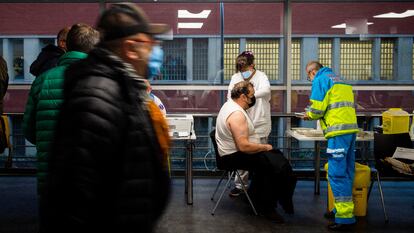Madrid reports first omicron infection with no connection to travel to southern Africa
The regional health department confirmed that the 62-year-old, fully vaccinated patient has the new variant and shows mild symptoms. Two more suspected cases are also under investigation

The Madrid region today confirmed its third case of a Covid-19 patient infected with the recently identified variant known as omicron. Unlike the previous two, who had recently arrived from South Africa, this is the first to have no links to the country – which was the first to identify the variant – or indeed other nations in the south of Africa.
The patient in question is a 62-year-old man who is fully vaccinated against Covid-19 with two doses of the AstraZeneca vaccine, according to a press release from the Madrid regional government. In this case, the man “does not have a travel history, nor has had close contact with another person who has been in countries where this variant has been detected, as had happened in previous cases, and presented the first symptoms on November 29,” the statement continued. On Thursday the man was in isolation in his home, along with the person who lives with him, who was “in a precautionary quarantine.”
The public health authorities are investigating another two suspected cases of the omicron variant, “both with mild symptoms and also without a history of travel to risk countries.” Madrid confirmed the first case of the strain in Spain on Monday, and the second on Tuesday. On Wednesday, the Balearic Islands confirmed a third case: a resident of Mallorca who arrived in Spain after traveling to South Africa. There are also two suspected cases in Catalonia.
The first case was a man who had arrived in Madrid from South Africa, with a layover in Amsterdam, on November 28. He is fully vaccinated with the Pfizer-BioNTech vaccine and displayed mild symptoms. He was placed in isolation and was being monitored by the health authorities, as were his close contacts from the flight that arrived in Madrid from the Dutch capital, a regional spokesperson explained on Monday.
A day later, a 61-year-old woman who is fully vaccinated with AstraZeneca arrived in Madrid from South Africa, having also passed through Amsterdam. After testing positive for the coronavirus via an antigen and PCR test, a sequencing process was also utilized given the country she had traveled from. She had “mild symptoms and is isolating and being monitored,” the regional government reported.
Since Saturday, the Covid-19 controls in Spanish airports have been stepped up. As well as a visual and temperature check on arrival – with testing carried out on the spot if there are any suspicions of infection – passengers arriving from risk countries must bring a negative coronavirus test with them, even if they have been fully vaccinated. This was not necessary until this weekend, after the alarm was raised about the potential risks of the new variant.
What’s more, the Health Ministry on Monday published an order obliging travelers from Botswana, Eswatini, Lesotho, Mozambique, Namibia, South Africa and Zimbabwe to quarantine for 10 days on arrival in Spain. The ministry announced yesterday that close contacts of domestic omicron cases will also have to isolate for 10 days.
The appearance of the omicron variant, first detected in South Africa a week ago, has health authorities across the world on alert. The scientific evidence on its potential danger is still very limited, but researchers have discovered that the strain contains more than 30 mutations. The World Health Organization (WHO) considers it a variant of concern, meaning it could be more contagious, virulent or able to escape the protection provided by Covid-19 vaccines or the antibodies produced after recovering from the virus.
Tu suscripción se está usando en otro dispositivo
¿Quieres añadir otro usuario a tu suscripción?
Si continúas leyendo en este dispositivo, no se podrá leer en el otro.
FlechaTu suscripción se está usando en otro dispositivo y solo puedes acceder a EL PAÍS desde un dispositivo a la vez.
Si quieres compartir tu cuenta, cambia tu suscripción a la modalidad Premium, así podrás añadir otro usuario. Cada uno accederá con su propia cuenta de email, lo que os permitirá personalizar vuestra experiencia en EL PAÍS.
¿Tienes una suscripción de empresa? Accede aquí para contratar más cuentas.
En el caso de no saber quién está usando tu cuenta, te recomendamos cambiar tu contraseña aquí.
Si decides continuar compartiendo tu cuenta, este mensaje se mostrará en tu dispositivo y en el de la otra persona que está usando tu cuenta de forma indefinida, afectando a tu experiencia de lectura. Puedes consultar aquí los términos y condiciones de la suscripción digital.









































